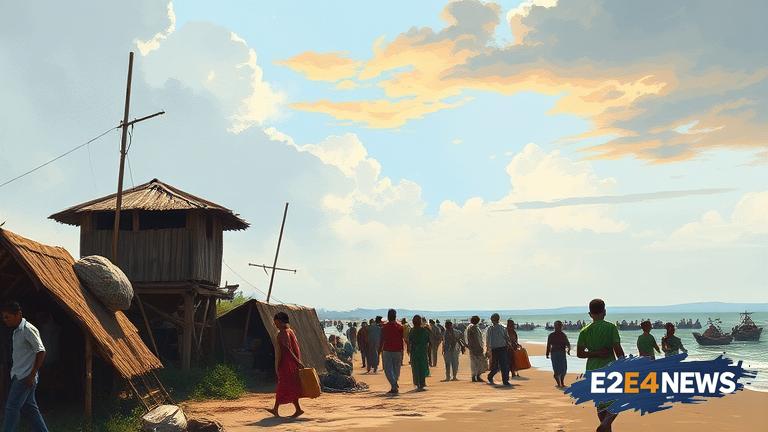The Rohingya refugee crisis has reached catastrophic levels, with thousands of Rohingya Muslims fleeing to Cox’s Bazar, Bangladesh, in search of safety and shelter. The exodus has been triggered by a surge in violence in Myanmar’s Rakhine state, where the military has launched a crackdown on the Rohingya population. The situation has been described as a ‘textbook example of ethnic cleansing’ by the United Nations, with reports of widespread human rights abuses, including murder, rape, and arson. The Rohingya have faced decades of persecution in Myanmar, where they are denied citizenship and basic rights. The current crisis has seen over 700,000 Rohingya flee to Bangladesh since August 2017, with many more trapped in Myanmar. The refugees are facing dire conditions in Cox’s Bazar, with overcrowding, poor sanitation, and limited access to food, water, and medical care. The Red Cross has warned of a ‘massive humanitarian crisis’ unfolding in the region, with the potential for disease outbreaks and further violence. The international community has been criticized for its response to the crisis, with many calling for greater action to be taken to protect the Rohingya. The Myanmar government has denied allegations of ethnic cleansing, claiming that the military is targeting ‘terrorists’ in Rakhine state. However, human rights groups have documented widespread abuses, including the burning of villages and the killing of civilians. The Rohingya have been forced to flee their homes, leaving behind their livelihoods and possessions. Many have reported seeing family members killed or injured, and have been left traumatized by their experiences. The crisis has also had a significant impact on the environment, with the destruction of forests and wildlife habitats. The Bangladesh government has been praised for its efforts to provide shelter and aid to the refugees, but has also faced criticism for its handling of the crisis. The international community has pledged millions of dollars in aid, but more is needed to address the scale of the crisis. The Rohingya refugee crisis is a complex and deeply entrenched issue, with roots in decades of discrimination and persecution. It will require a sustained and coordinated effort to resolve, including greater action from the international community and the Myanmar government. The situation remains dire, with thousands of Rohingya still trapped in Myanmar and facing imminent danger. The world must act now to prevent further suffering and to ensure that the Rohingya are able to return to their homes in safety and dignity. The crisis has sparked widespread condemnation, with many world leaders calling for an end to the violence and for the protection of the Rohingya. The United Nations has warned of a ‘lost generation’ of Rohingya children, who are being denied access to education and healthcare. The crisis has also had a significant impact on regional stability, with concerns about the potential for further violence and extremism. The international community must work together to address the root causes of the crisis and to find a lasting solution to the Rohingya refugee crisis.
Wed. Sep 10th, 2025





